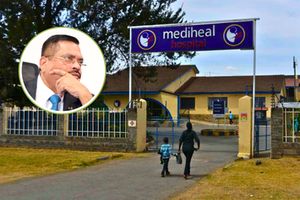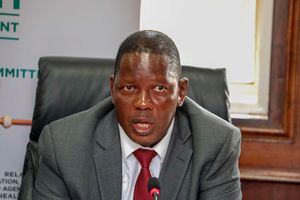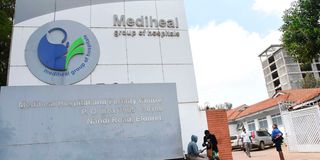
The entrance to Mediheal Hospital and Fertility Centre in Eldoret town, Uasin Gishu County on June 20, 2022.
A member of a government team that investigated suspicious kidney transplants at Mediheal Hospital has sensationally claimed that the final report was doctored to exclude damning findings, deepening a controversy surrounding alleged organ trafficking.
The report by the 12-member team flagged “suspicious activity for trafficking,” identifying one individual whose name appeared repeatedly as next of kin in multiple files for both foreign recipients and kidney donors. However, the report noted that “there is no sufficient evidence” to support trafficking claims, instead recommending further investigations after reviewing records of 372 kidney transplants conducted at Mediheal Fertility and Transplant Centre since 2018.
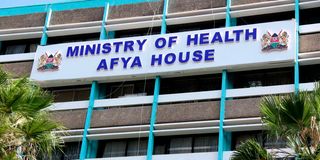
The Afya House which hosts the Ministry of Health in Nairobi.
Although the fact-finding mission at the Eldoret-based hospital was conducted in December 2023, the findings remained unpublished until an exposé by Nation on Monday triggered a response from the Ministry of Health, which has since pledged to conduct a follow-up inspection of the facility.
One member of the probe team, appointed by the Kenya Blood Transfusion and Transplant Service (KBTTS), told Nation that he and two colleagues disowned the final report. The trio reportedly walked out during the drafting stage, citing interference from senior Ministry of Health officials who allegedly pressured them to exclude adverse findings.
The three dissenting members were seconded to the committee by the Kenya Renal Association (KRA), which had petitioned the government to investigate Mediheal.
Dr Philip Cheptinga, a nephrologist and KRA representative on the committee appointed by acting KBTTS CEO Dr Maurice Wakwabubi, alleged a cover-up.
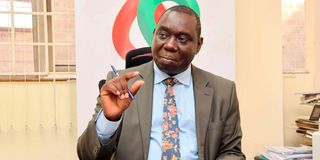
Kenya Tissue and Transplant Authority CEO Wakwabubi Maurice during an interview at his office in Nairobi on April 4, 2024.
“The orders came from above - from the Health ministry itself - and we were told to comply. Three of us who were unwilling to do so walked away from the final stages of developing the report based on our fact-finding mission at Mediheal,” Dr Cheptinga told Nation in an exclusive interview on Wednesday, while presenting official minutes of the meetings.
KRA President Dr Jonathan Walla corroborated this account, stating that the three members submitted a report to KRA detailing how the committee had been instructed to heavily redact the final document to remove adverse recommendations against Mediheal.
He confirmed the trio - Dr Cheptinga, Dr John Ngigi and Dr Peter Maritim - had walked out in protest. “When I sought clarification as president, they told me the findings had been watered down in favour of Mediheal, and that instructions came from above. I’ve seen the raw findings, and for example, they established that three Israeli nationals received non-viable kidneys even after paying,” said Dr Walla.
The scandal has escalated following the airing of an explosive documentary by DW TV, which exposed a global organ trafficking network allegedly linked to an Israeli-owned online medical company.
According to the documentary, the foreign firm has been working with Mediheal to harvest kidneys from impoverished Kenyans, who are paid KSh294,000 for their organs. These are then sold to recipients in Germany for Sh3.2 million each.
Dr Cheptinga claimed that interference with the final recommendations is the reason Mediheal escaped with what he termed a “slap on the wrist.”
“After discovering the interference, we distanced ourselves and left the team lead and others to handle their skunk,” said Dr Cheptinga, a senior KRA member.
He questioned why the Kenya Medical Practitioners and Dentists Council (KMPDC) had licensed foreign doctors who had previously been banned from practising medicine in Pakistan and India, and who have now set up shop in Kenya for illegal kidney transplants.

Mediheal Hospital and Fertility Centre in Eldoret town, Uasin Gishu County.
“Why do you think it took over a year for Kenyans to learn the truth despite the investigation concluding in 2023? It’s thanks to the media,” he said, alleging powerful government figures have suppressed the findings.
Dr Cheptinga, who also works at Moi Teaching and Referral Hospital (MTRH), said four patients awaiting transplants at Mediheal recently vanished after authorities contacted the Directorate of Criminal Investigations (DCI). He shared their names with Nation, though these have been withheld for legal reasons.
“In one case, a recipient from Somalia had his abdomen sewn up immediately after staff were alerted that DCI officers were on-site. The donor was discharged, and all foreign doctors left the country,” he said.
He further claimed that vulnerable young Kenyans are lured into selling their kidneys, and then issued with fake Somali passports to appear as foreign donors. This, he said, explains why Mediheal records showed “cousins” from Somalia donating organs to recipients from Azerbaijan and Uzbekistan.
“The committee also found that if a Kenyan donor was under 18, Mediheal would issue a Somali name and passport before harvesting their kidney,” he claimed.
He added that the hospital continued transplants in early 2024, with six in February, ten in March, and two in April. Most recipients were from Israel, and donors were allegedly drawn from Kenyan counties including Uasin Gishu, Nandi, Kisumu, and Homa Bay.
“We are now seeing an influx of dialysis patients who don’t speak Kiswahili, don’t use M-Pesa, and only pay in cash while claiming to be from Nairobi,” he said.
Dr Walla added: “If you have money in Kenya, people will compromise their morals—even selling their own mother.”
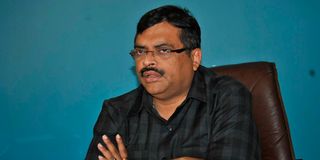
Mediheal Hospital Chairperson Dr Swarup Mishra. He has said the hospital does not engage in organ trafficking.
Mediheal chair Dr Swarup Mishra denied the allegations, saying the hospital does not engage in organ trafficking.
“In the name of God, I swear we have not selected any donor or paid them. In Kenya, even if Jesus came, people would still demand he go,” Dr Mishra said.
He added that Mediheal is awaiting a proper legal framework to guide donor selection, which the Ministry of Health is currently developing.
Mediheal Vice President Maryline Limo also said the hospital had not received any official report from the ministry.
“Dr Everline Chege, the team lead, rejected claims that some members disowned the findings.
“The report I handed over to the acting CEO was duly agreed upon by all members,” she told Nation.
Nation reached out to CS Duale, including on allegations of report tampering, but he was unavailable. Health ministry officials said he was occupied with other national matters.
Acting KBTTS CEO Dr Wakabubwi did not respond to our inquiries. Mr John Gikonyo, President of the Renal Patients Society of Kenya (RPSK), supported the whistleblowers, saying the report only came to light after Nation obtained it.
“The government must treat this matter with the seriousness it deserves,” he said.


